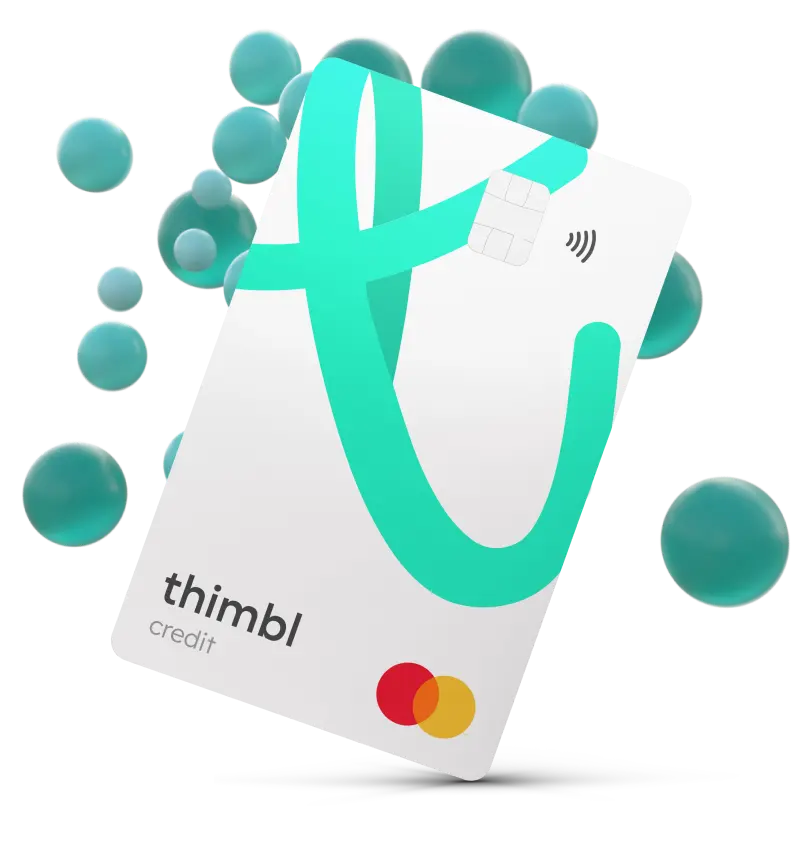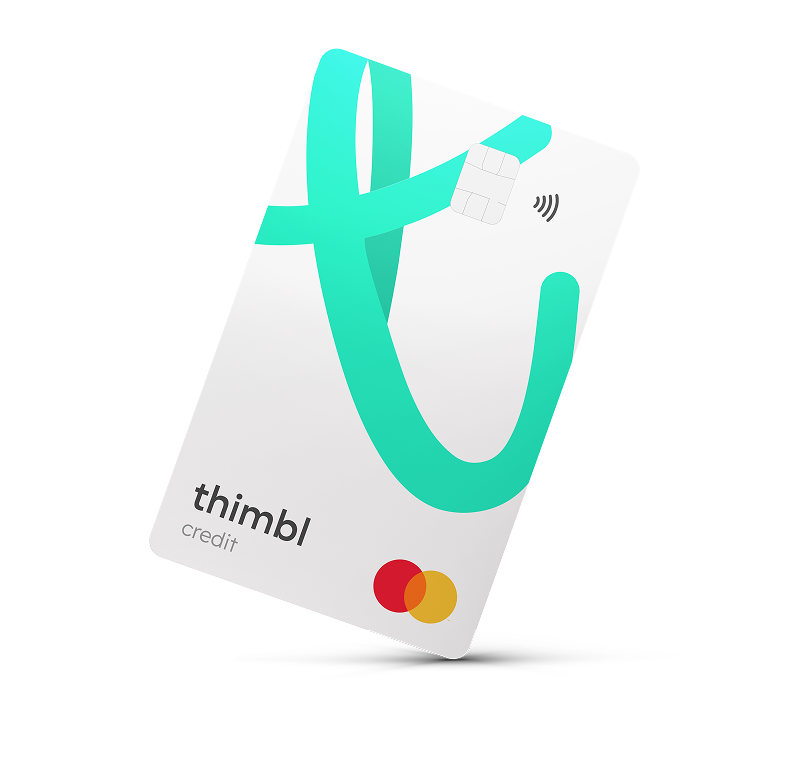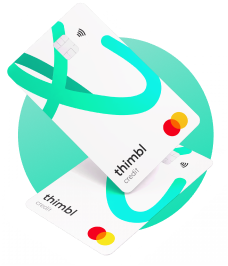Can You Withdraw Money With a Credit Card?
Can You Withdraw Money With a Credit Card?
 Understand the implications of using a credit card to withdraw money from an ATM
Understand the implications of using a credit card to withdraw money from an ATM Find out about the costs and fees associated with a cash advance
Find out about the costs and fees associated with a cash advance With thimbl, you could get an initial credit limit up to £2,000
With thimbl, you could get an initial credit limit up to £2,00048.9% APR Representative (variable)
Subject to affordability



 For all credit scores
For all credit scores
 Check eligibility with no credit score impact
Check eligibility with no credit score impact


Using your credit card to withdraw money is called a ‘cash advance.’
While a cash advance might seem like a straightforward way to access money, you should be aware of the effect it could have on your credit score, as well as the associated costs.
The short answer to this question is yes, you can use your credit card to withdraw money. However, you should know the facts and do some thorough research before deciding whether this method is a suitable option for you.
A cash advance could be accessed in a number of ways, including through a cash machine or, if your credit card is provided by a high street bank, in-person at your local branch. Please be aware that you may be asked to provide ID to complete the transaction at the bank.
- For all credit levels, from poor to excellent
- Checking won’t affect your credit rating
- 48.9% APR Representative (variable)

Why you should think very carefully before you consider a cash advance
- A cash advance will leave a mark on your credit file for up to six years. Should you need to apply for credit in the future, lenders will be able to see this.
- Lenders may view a cash advance as a sign of poor money management, which could be an influencing factor in their decision when considering any application for credit.
- Your credit score could be negatively affected by a cash advance.
- A cash advance could be an expensive way to access money. We’ll look into the potential costs in the next section.
How much does it cost to withdraw money from a cash machine with a credit card?
Using your credit card to withdraw funds can be expensive and it’s important to understand the potential costs before you make a transaction.
- Cash advance fee
Each time you use your credit card to withdraw money, you’ll be charged a cash advance fee. This could either be a set amount or a percentage of the amount of money that you’re withdrawing. For example, your credit card provider might charge a 3% cash advance fee. In this instance, using your credit card to withdraw £100 would incur a cash advance fee of £3. There may also be a set minimum fee you’ll pay. - Interest
You will be charged interest from the day you complete a cash advance until you clear the balance in full. The interest rate for a cash advance could be higher than the standard rate of interest that you’d be charged to make a purchase. You should be able to find out your interest rates on your credit card statement, through your online banking account, or by contacting your provider.
How much money can I withdraw using my credit card?
The amount of money you’re able to withdraw using your credit card will depend on several factors, including your personal overall credit limit and your current available balance. Your provider may also set a cash advance limit, which will restrict the total amount of money you’re able to access. For example, this could be 50% of your overall credit limit.
It’s very important to remember that just because you could get a cash advance, it doesn’t mean that you should. Again, you should take the time to consider the cost of a cash advance and the potential negative effects that one could have on your credit record and score.
Can I use my credit card to withdraw money while abroad?
Yes, you can, but again, this isn’t a decision that should be taken lightly, if you have other options to consider first.
Using your credit card to withdraw money while abroad could come with added fees. Opting to withdraw cash in British pounds, rather than local currency, could mean that you’ll also incur a dynamic currency conversion (DCC) fee.
Alternatives to a credit card cash advance
- Is your need for money urgent? If not, could you wait and save up instead? This will, of course, take longer, but you won’t need to pay any interest or fees.
- Could a friend or family member lend you the money that you need? If you do take a loved one up on their offer of help, you should both agree on a clear repayment plan. It might be a good idea to get this in writing.
- If you have the funds available, you might consider using your debit card instead. Using your debit card to withdraw money could be cheaper than a credit card cash advance. Many cash machines in the UK are free to use, although you may be charged to use others. Cash machines that charge for service should be clearly marked so you know what to expect.
Credit card health check
A credit card could affect your credit score in several ways, but there are things you can do to work towards a healthier credit position.
- Stay well within your credit limit. Your credit limit is the total amount of money you are able to borrow on your credit card account.
- Aim to keep your credit utilisation as low as possible. Credit utilisation is the amount of money you’re currently using of your overall credit limit and is shown as a percentage. If you had a credit limit of £2,000 and you spent £200 of that, your utilisation would be 10%.
- Where possible, avoid using your credit card for a cash advance.
- Depending on your provider, you might be able to disable the option of a cash advance on your credit card. If this is something you’d be interested in, you could contact your provider for more information.
- Make at least the minimum repayment amount due on time each month. If you’re able to, you should aim to pay more than the minimum amount. You won’t be charged interest if you pay your balance in full and on time every month.
- Try to keep your credit applications to a minimum. Each time you apply for credit directly with a lender, they will carry out an affordability check. This usually involves a hard credit search, although your lender may use Open Banking as part of their process. A hard search will remain on your credit file for up to 12 months and multiple hard searches within a short period of time could cause your credit score to decline.
Worried about money? Help is available
Whether you’re concerned about the cost-of-living crisis or personal debt, please know that you can access free, confidential advice through sites such as StepChange, MoneyHelper, Citizens Advice, and National Debtline.

Page last reviewed: 7th February 2025
Page reviewed by: Alex Kosuth-Phillips
You get all this with thimbl
Tap and go
Quick and easy contactless payments up to £100.
Secure banking app
Manage your credit card online, wherever and whenever you like, with the free mobile app.
A trusted service
Over 4,500 positive reviews from our customers.
48.9% APR Representative (variable)
Quick links







Worried about money?
If you're worried about the cost of living, need support with budgeting, or think you might need debt advice, StepChange could help. They offer free and impartial support and help hundreds of thousands of people every year to deal with their debts and take control of their finances.
To find out how StepChange could help you, take the free Money Health Check. It's quick and easy to complete, and will give you a personalised recommendation on what to do next.
Meet the team
Head of Compliance
Head of Partnerships
Managing Director, thimbl
Marketing Manager, thimbl
Financial Content Writer
Frequently asked
questions
If you've got a question, you may just find the answer you're looking for here. If not, please visit our contact us page and get in touch.
What will my credit limit be?
You will always be made aware of any credit limit changes to any credit cards you have beforehand, and you do not have to accept a credit limit increase if you don't feel it's right for you.
What happens if I fail to make my repayments?
Missed payments will be reported to the credit bureaus, and your account will appear as in arrears. You will be charged a late fee, which is usually around £12. Your credit rating is also likely to decline as a result.
You should try to make your missed payments as soon as possible.
If you're struggling to keep on top of your repayments, you can find free, impartial advice from MoneyHelper, StepChange, Citizens Advice and National Debtline
If you want to know more about how credit cards work, you can read our blog.
Did you find this article helpful?
Let us know how we can be more helpful
Please leave your anonymous feedback to help us keep improving.
Need help or support?
Whether it's a question or you just need support, we're here to help.






